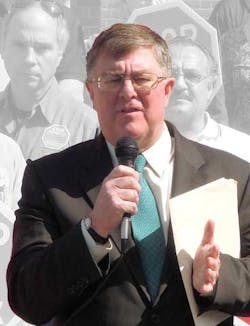On Sept. 26, 2009, President Barack Obama’s tariff on passenger and light truck tires imported from China took effect. During its three-year duration, the tariff would start at 35%, go down to 30% the second year and decrease to 25% the third. Those percentages were in addition to the already implemented 4% duty.
In President Obama’s State of the Union address in January 2012, he said, “Over a thousand Americans are working today because we stopped a surge in Chinese tires.”
That surge was documented by the Wall Street Journal, which reported that between 2004 and 2008, China’s share of the U.S. tire market went from 5% to 17%.
A slowdown in that surge is also documented by the U.S. International Trade Commission (ITC). ITC said the tariffs resulted in a 30% reduction in Chinese tire imports from 2009 to 2011.
The president’s claim of 1,000 new jobs can be debated. According to the U.S. Bureau of Labor Statistics (BLS), in 2010 51,600 people were employed by tire manufacturers. In 2011 that only rose by 100 jobs, to 51,700.
The BLS also said that in 2009, there were 55,000 workers in the U.S. tire manufacturing industry. Back in 2000, the BLS said there were 86,800. Where did the 31,800 jobs go? These U.S. jobs were lost when manufacturers began making low cost radial tires in other countries, because of cost savings in operations and labor. Now many of those foreign-made tires are coming to the U.S. in place of tires from China.
The ITC said that from 2009 to 2011, 30% more tires were imported from Canada, 110% more from South Korea, 44% more from Japan, 152% more from Indonesia, 154% more from Thailand, 117% more from Mexico and 285% more from Taiwan.
Did the tariff on Chinese tires save U.S. jobs? The facts can be debated, but one fact cannot: The tariff on Chinese tires has been politicized – and this is a presidential election year.
Will President Obama allow the tariff to be lifted? Or will he need the support of groups who favor a tariff – and continue a duty in some form?
This summer, there will be even fewer Chinese tires in the U.S. During the months of July, August and September 2012, Modern Tire Dealer columnist Saul Ludwig expected there to be a sharp decline in the number of Chinese tire imports. Why? Because no one wants to pay a tariff on tires if it’s about to expire.
But will it expire? To get a feel for the possible scenarios, MTD spoke with Tire Industry Association (TIA) Executive Vice President Roy Littlefield. TIA was one of the first groups to officially oppose the tariff when it was announced in 2009. At the time, TIA issued a press release that stated:
“TIA believes this was a politically motivated decision that will end up costing more jobs than it saves.”
[PAGEBREAK]
MTD: Did the tariff save U.S. jobs?
Littlefield: We meet every year with the tire manufacturers and many of them believe the tariff did not save any jobs in America. That’s not an argument that holds water. I’ve said that in testimonies to the World Trade Organization (WTO) and on Capitol Hill; I’ve also said it to the trade press. However, the tire industry is doing very well in the U.S. and it will continue to do well.
MTD: How has the tariff affected TIA members?
Littlefield: I hear a lot from companies that imported tires from China. They’re saying, “We don’t know what to do. We don’t know if we should gear up, shouldn’t gear up, we don’t know what’s going to happen.”
When you look at the numbers of how fast the importation of tires from China was growing, they were a player and it was becoming an issue. More dealers were looking at selling those tires in addition to other tires. I think the tariff had an impact on the whole retail industry.
Some companies will argue that the number of imports has not suffered; it’s just where they’re coming from. Companies have said, ‘We’re global companies and some of the tires that were coming from China now can go to another country and tires made in places like India and Mexico can come in.
MTD: Will President Obama drop the tariff?
Littlefield: There is a presidential election. Things are very close, the polling is very close and the president needs the support of labor. The president cited the Chinese tariff in the State of the Union address. If he needs to do something right before the election to show that he is protecting jobs and trying to work with the labor unions, he could extend the tariff for another year.
There are a lot of people in this industry who have a lot at stake here. If the tariffs come off, how immediate will the impact be? I don’t know. China’s share of the U.S. market went from 5% to 17% between 2004 and 2008. Would that happen again? It could. If Obama is not elected, people might be more comfortable looking to the Chinese tire market.
MTD: What are some possible scenarios?
Littlefield: He could lower the tariff again. Or he could remove it. Or extend it.
Depending on the level and how the Chinese respond to that level in their pricing, will determine whether the Chinese are a major force if importers will continue to look at other countries. The largest tire manufacturers are all global, so if one is making tires in China, they’re probably making them in places like India, Mexico and Brazil. Sometimes it’s easier to look for a new source within the same company than it is to go out and find a new company. I don’t think the number of imports will go down; it will just affect where they’re coming from. ■



